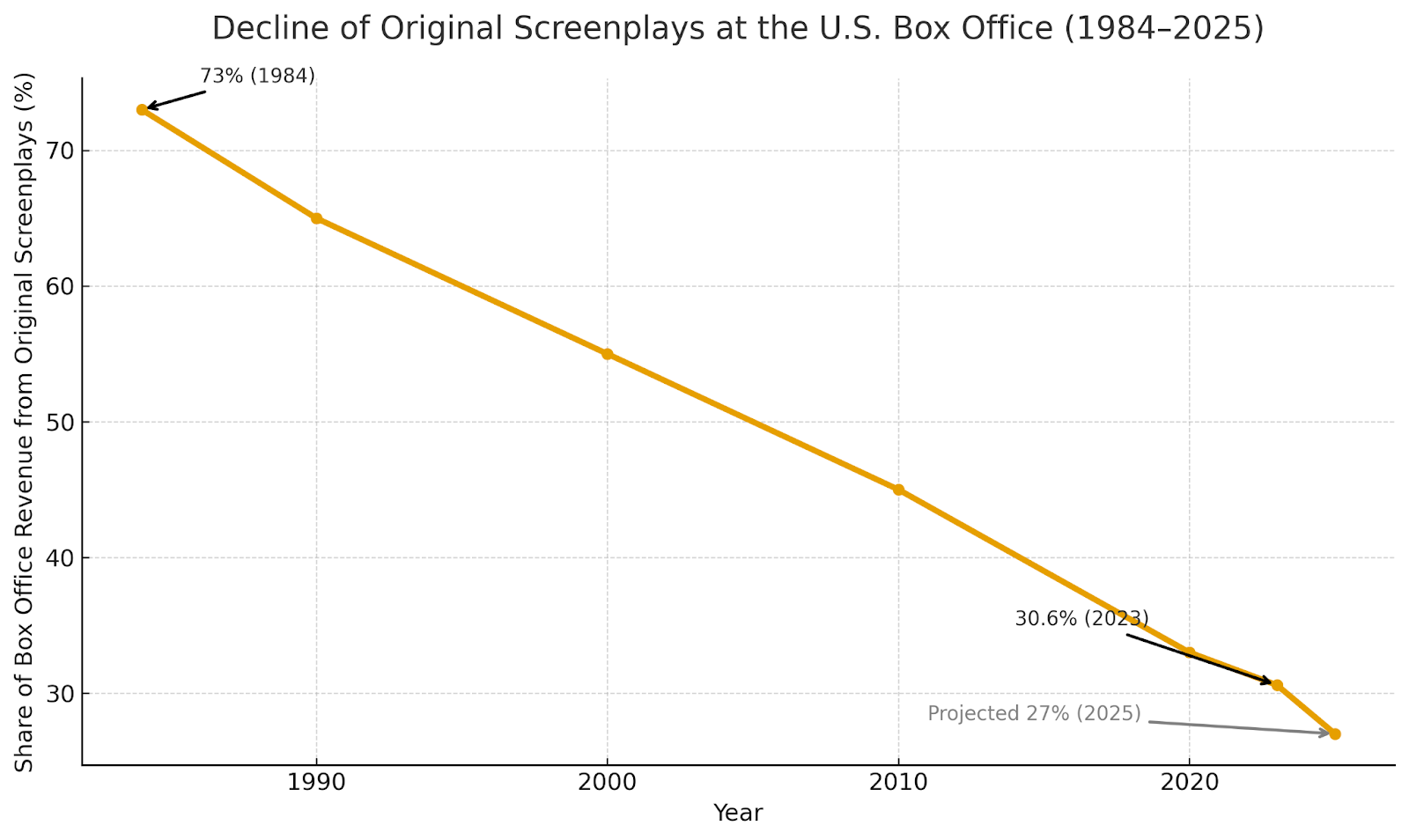Hollywood’s Next Financier: You
Hollywood has hit a breaking point. Audiences are fatigued by franchise sequels and reboots. YouTube has overtaken Disney as the world’s largest distributor. And Gen AI tools like Sora 2 can soon turn anyone into a filmmaker. Yet one thing hasn’t changed: how films get financed. And that’s why we keep getting fewer original films.

Decline of original screenplays at the US box office (1984-2023)
Source: The Numbers and Box Office Mojo
For decades, filmmakers have had only two ways to raise capital: courting wealthy “patrons of the arts” or signing away IP in restrictive studio deals. These small circles still control who the next David Lynch will be, or which film becomes the next Napoleon Dynamite, while everyday fans — the people who live and breathe these films — have never had a seat at the table. (Fewer than 1% of Americans meet SEC “accreditation” standards to invest in most private ventures, including film.)
That’s finally changing, thanks to tokenization. The promise of "decentralization in film” has arrived, quietly and legally this time. A few years ago, “Web3 Film” had the right dream but the wrong tools: people were slicing films into NFT frames, touting complex tokenomics and skirting securities laws. None of it worked. Projects like Stoner Cats, Ashton Kutcher’s NFT cartoon, became cautionary tales after the SEC cracked down for selling unregistered securities to unaccredited investors.
Today, the difference is compliance. Through licensed platforms operating under SEC exemptions such as Reg CF, production companies can take on thousands of unaccredited investors (even in the U.S.) to back real film projects and share in the upside. Security tokens issued on blockchain rails make it possible to distribute dividends transparently and cost-effectively — and, eventually, trade investors’ stakes on secondary markets.
And it’s already working. Tens of thousands of investors have contributed more than $30 million to premium productions from some of Hollywood’s most respected names. This year, Robert Rodriguez (Sin City, Spy Kids) raised $2 million from 2,000 fans to invest in new action films — and every investor got to pitch him a film as part of the slate. Pressman Film — the company behind American Psycho, Wall Street and The Crow —raised $2 million for a slate of bold, original films, and is already starting to return capital within six months. And Eli Roth (Hostel, Inglorious Basterds) launched a fan-owned horror studio that maxed out its $5 million Reg CF campaign in July. He was tired of studios deeming his ideas too gory, even though the most profitable film of 2024 was the unrated slasher, Terrifier 3.
Tokenized fan investing is opening up new paths for capital and creativity. Filmmakers can now tap their audiences for capital instead of taking the studio deal, allowing them to retain more ownership of their IP and take creative risks without interference from the suits or the algorithm. For fans, tokenization opens up access to a previously inaccessible opportunity: investing in film as an alternative asset class. Ultimately, these projects tend to perform better — not just creatively but financially — as audiences with skin in the game drive buzz and box-office returns.
The timing couldn’t be better. With IPOs slowing and private markets swelling, tokenization is unlocking billions in household capital and opening doors to previously gatekept opportunities across private credit, venture capital and now, film. The GENIUS Act has brought long-awaited regulatory clarity to digital assets, while institutions from BlackRock to Visa are embedding blockchain infrastructure into the mainstream economy. Tokenization has quietly graduated from crypto casino to financial plumbing, and entertainment is proving to be one of its most relatable (and needed) use cases.
There may be no better Trojan horse for mainstream adoption of tokenization than culture real-world assets (RWAs). Few industries are as ripe for disruption as film, and none as universally relatable, considering nearly all of us end our day watching Netflix (and then complain about the content). But when the audience can invest in the projects they want to see, whether from established filmmakers or up-and-coming creators, we won’t just get new financing models. We’ll get better movies.
Disclaimer: The content of this article solely reflects the author's opinion and does not represent the platform in any capacity. This article is not intended to serve as a reference for making investment decisions.
You may also like
The Growing Influence of Health and Wellness on Academic and Professional Growth
- Global workforce transformation integrates wellness, cybersecurity, and tech innovation to address burnout, skills gaps, and rising cyber threats. - AI-powered wellness tools like JuggernautAI and Whoop Coach boost productivity by 20% through real-time health monitoring and personalized interventions. - Educational institutions face 35% higher cyberattacks, shifting to zero-trust security and upskilling staff to manage AI risks in K-12 and higher education. - EdTech's $163B market growth prioritizes AI-d

New Trends in Public Interest Law Careers and Their Influence on Law School Financial Structures
- Growing demand for public interest legal careers is reshaping law school funding models through scholarships, endowment reallocations, and policy-driven financial strategies. - Institutions like Berkeley and Stanford prioritize public service by offering full-tuition scholarships and redirecting resources to legal aid, addressing unmet low-income legal needs and graduate debt challenges. - Federal policies, including tiered endowment taxes and loan reforms, force schools to balance fiscal responsibility

Evaluating the Factors Driving the Recent Rise in Trust Wallet Token’s Value
- Trust Wallet Token (TWT) price surge stems from institutional adoption and ecosystem expansion, redefining its utility and market perception. - Partnerships with Ondo Finance (RWAs) and Onramper (fiat-to-crypto onramps) enhanced institutional credibility and global accessibility for 210 million users. - Utility-driven features like FlexGas (TWT-based transaction fees) and Trust Premium (loyalty incentives) boosted demand while reducing circulating supply. - 200M+ downloads and 17M monthly active users by

OpenAI secures business victory just days following internal 'code red' over Google competition

